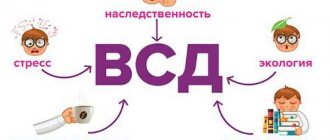In our modern world, a large amount of energy is spent on stress and worry for various reasons. As a result of stress, quite often a person can experience depression and sometimes other psychological disorders.
Let's look at the main differences between stress and depression. Almost all people are well aware of what causes stress. Stress in the usual sense is the body’s reaction to a person’s emotions during certain situations when he experiences tension, anger, and cannot cope with the situation. Scientists say that stress in moderation is beneficial to the body, it causes a surge of adrenaline, makes a person think more intelligently, and look for a way out of a difficult situation. However, frequent stress can lead to illness; stress is the beginning of depression.
What is the difference between stress and depression: definition
Stress and depression are two different conditions. They should be distinguished.
Stress is a flash of emotions that occurs as a reaction of the body to some strong influences or certain events. There are positive and negative forms of stress. A person responds emotionally to a factor that irritates him for as long as this factor lasts. And depression can be the result of this outburst of negative emotions. The situation that caused depression passes, but the person constantly remembers it and falls into the past, which provokes such an internal state in him.
Stress can be described in two words as tension and emotion. Depression is like a mood or state. There is undoubtedly a difference in concepts. Depression and stress appear in a person for various reasons, at different periods of his life. Parting with a loved one may have a very strong impact on one person, but on another it will not make such a negative impression. There are certain categories of people who are most prone to stress or depression:
- Dreamy individuals. Many people dream of a good and bright life in the future. Having a positive outlook on your life helps you maintain a positive attitude. But when things don't work out and dreams crumble, he begins to realize that there is nothing good in this life and that a bright future will never come. If a person dreams too much about what he will never have in his life, then he is likely to become depressed.
- The person is not ready to face difficulties. When a person acts, he does not think that his actions may be erroneous and wrong. If he encounters difficulties, this means that he is taking unnecessary actions that cannot help him achieve certain goals. Without admitting mistakes and unwillingness to change their actions, people plunge into stressful conditions.
- High expectations from life. The person does nothing, but simply waits. In his opinion, life, fate and other people should give him well-being, joy and happiness. But ultimately a person realizes that he has nothing. After this, he begins to be offended by the people around him and fate in general. This resentment causes stress, and dissatisfaction with the current state of affairs provokes depression.
The essence of the method.
1. We produce all our thoughts ourselves. 2. We feel what we think. 3. We can start to think differently. So we’ll start to feel differently. 4. To think and feel differently you need to enter the zero point. What is zero point? This is when, in general, there are no thoughts and feelings (neither good nor bad)! How is this possible and why is it needed?
In order to fill a glass with clean water, you must first empty it of dirty water.
This is what we will do:
- Let's free ourselves from all old and negative feelings and emotions.
- Then let’s fill ourselves with bright and pure thoughts and feelings. You will have calmness, concentration and “freshness of mind.” Memory will improve and energy that was previously spent on anxiety and stress will be released.
- Now you will spend your freed energy on your goals.
Now let's start practicing.
Description of stress
Stress is a defensive reaction to strong mental, physiological or emotional stimuli. Stress can also be a reaction to overexertion, fatigue, various experiences, and anxiety.
When a person undergoes adaptation to new conditions, there are the following stages:
- Anxiety stage.
- Resistance stage.
- Exhaustion stage.
Negative stress manifests itself in failure to adapt to new conditions, which can result in exhaustion and vulnerability. Positive stress leads to adaptation, since it is based on positive emotions and impressions.
Depression as a reaction to stress
It is very important to understand the difference between stress and depression and what kind of condition it is. It can be caused by anything: failures and mistakes, a negative assessment of one’s activities, any disappointments. Small stresses are beneficial for the body, making the human body more resilient and strong. However, large-scale stress that causes depression destroys the psyche and the body as a whole.
There are two forms of depression: moderate and severe. Typically, the average form of depression lasts about two weeks. Severe cases can last for several months. Sometimes there are cases when depression lasts for several years.
What is the difference between stress and depression: differences in symptoms
You can distinguish stress from depression using certain symptoms. It is worth highlighting the differences in the symptoms in which these conditions manifest themselves.
The following are signs of stress:
- Forgetfulness and disorganization of a person.
- Difficulty remembering new information.
- Difficult decision making.
- Absent-mindedness.
- Restlessness and anxiety for no reason.
- Hot temper.
- Insomnia and poor sleep.
- Panic attacks.
- Strong feelings of guilt.
- Constant change of mood.
- Frequent urination.
- The appearance of constipation or diarrhea.
- Chest pain with rapid heartbeat.
- Dizziness and nausea.
- Labored breathing.
- Dry mouth.
- Muscle spasms.
- Trembling of legs and arms.
- Allergy.
- Weakness and fatigue.
- Goosebumps on the body.
- Use of drugs or alcohol.
- Speedy or slow speech.
Depression can be easily distinguished from stress by the following symptoms:
- Irritability and fatigue.
- Rapid mood swings.
- Lost interest in work, people and events in life.
- Feeling of uselessness and loneliness.
- A state of guilt before everyone.
- A state of rage for no reason.
- Thoughts about suicide.
- A tearful state.
During depression, the joy hormone, which is located in the human brain, very quickly depletes its reserves. Therefore, during this state, a person cannot enjoy anything; he is constantly in a bad mood.
Self-diagnosis of depression
The fundamental signs of depression cannot be confused with anything, let’s look at them carefully.
Anhedonia
Complete loss or sharp decrease in the ability to experience joy. Life becomes discolored or seen in dirty gray or black tones. Not a single thing, even the most significant and positive (from the point of view of healthy people), causes pleasant experiences. Any communication and activity becomes a burden because a person does not get pleasure from them.
Cognitive disorders
There are many problems with mental activity. In the early stages, analytical and creative abilities are not impaired, although they acquire a pronounced negative connotation.
Signs that precede deep depression:
- impenetrable pessimism;
- a state of constant despondency (“life is meaningless”, “nothing good awaits me in the future”);
- sharply negative judgments on any occasion (often without any real basis).
Catastrophic decline in self-esteem
The attitude of a depressed patient towards his person is, at best, full of constant irritation and harsh self-criticism. With an advanced disease, a person gradually begins to experience increasing self-loathing, reaching the point of hatred and the appearance of suicidal thoughts.
Suicidal mood
The world would be a better place if I weren’t in it”, “It would be easier for my family without me”, “I don’t deserve happiness”, “I’m a nonentity, incapable of anything” - such programs can drive a person to real suicide and can only be eliminated with the help of an experienced psychotherapist, psychologist or psychiatrist.
Decreased or complete lack of interest in favorite activities
Some symptoms of depression can be observed (separately) among other mental disorders, but a complete and sudden loss of interest in one’s favorite activities/hobbies is characteristic of melancholy!
“A musician who has stopped expressing his soul through music. An artist who gave up drawing. A scientist who has stopped enthusiastically discussing the subjects of his scientific research,” someone thinks that they have lost the Muse. In 90% of such cases, people experience depression and often do not realize their condition, believing that they are simply stuck in everyday life and in a bad mood.
Source: OStresse.ru
How is stress different from depression?
Stress can be characterized as a defensive reaction to negative external influences, which helps to cope with dangerous situations in life. The absence or weak manifestation of this reaction means that the body is exhausted and needs time to restore energy. When energy accumulates, a person at this time is weak and defenseless. It is during this period that depression can develop. How is stress different from depression? Prolonged stress can be called a disease that ends in complications. In this case, depression acts as a complication. Therefore, the difference between depression and stress lies in the degree of complexity of the condition.
Ways to deal with stress
There are many ways to deal with stress, but what works for one person may cause frustration or greater stress for another. There is only one way out - choose methods for yourself, apply and see the result, this is the only way to get out. Individual ways to deal with stress:
- change in diet;
- inclusion in your schedule of exercises, or the physical activity that you like;
- handicrafts;
- meditation;
- autogenic training;
- breathing exercises;
- art therapy
Psychologists recommend starting to practice meditation to prevent or eliminate stress. All effective ways to deal with stress are aimed at harmonizing the internal state and meditation is a simple way to regain calm and get rid of chronic tension. Meditation practices for stress:
- Dynamic meditation, the creator of which is considered to be the sage Osho. Meditation will be useful for those who are used to getting rid of stress through physics (the body). Turn on rhythmic music. Take the position: feet shoulder-width apart, knees slightly bent and begin lightly shaking your head, arms, legs - 5 minutes. Then dance for 10 minutes. Listen to the music for the next 10 minutes. For the last 10 minutes you need to lie down in silence and listen to yourself.
- Meditation-relaxation. Lie on your back in the dead man's pose - savasana. Relax, inhale through your nose and hold your breath for 3–4 seconds, then exhale, imagining how all the accumulated negativity goes away. Do several such cycles.
Nutrition largely determines a person’s well-being. How to deal with stress through nutrition and is it effective? Yes, scientists are interested in developing techniques to combat stress through nutrition. The so-called anti-stress diets have already been appreciated by many people suffering from chronic fatigue and stress. What foods should you include in your diet when you are stressed?
- all vegetables and fruits that have an orange color (oranges, tangerines, pumpkin, apricots (dried apricots), carrots) - the bata-carotene they contain and vitamins A and C help the psyche cope with daily difficulties and trials;
- berries (cranberries, lingonberries, blackberries, sea buckthorn, cherries) - a mix of these wonderful gifts of nature can invigorate the most tired body, promotes the production of serotonin, the hormone of joy;
- seaweed - regulates hormonal metabolism, and hormones are mood stabilizers, natural iodine gives stamina and performance;
- nuts (walnuts, pine nuts, cashews, almonds) are a storehouse of polyunsaturated acids, a source of B vitamins, without which the nervous system cannot function normally;
- red fish (salmon, sockeye salmon, trout) - reduces the level of cortisol, a hormone produced by the adrenal glands during stress.
The famous Dagestan psychiatrist and philosopher Khasai Aliyev created a unique technique of psychophysical self-regulation “Key”, it was developed for cosmonauts under constant stress conditions. Techniques for dealing with stress in the “Key” system are simple and effective. These are 6 basic ideomotor movements, repeated several times:
- “Arm divergence” - hands in front of you, you can close your eyes and imagine that your hands diverge to the sides without any effort, your hands will begin to move.
- “Convergence of hands” - spread your arms to the sides, then do it mentally, ideomotor, feel the internal connection of thought and automatic movement in response.
- “Levitation of the hand” - hands are lowered, look at your right or left hand and mentally give it the command to smoothly rise and fall; it is better to do the exercise with your eyes closed.
- “Flight” - let your hands float up one by one like wings and control the flight through an effort of thought, a surge of strength will begin.
- “Self-oscillations of the body” - it comes by itself after performing the exercises described above, trusting the body and swaying.
- “Head movements” - start lowering, raising, rotating your head and try to do it ideomotorically, if initially it doesn’t work, then relax and rotate through effort, but smoothly, without tension.
There are also creative ways to deal with stress - modern psychology calls these methods art therapy. What areas of art therapy help with stress:
- modeling (plasticine, clay);
- drawing;
- fairytale therapy;
- games.
A very good method for dealing with stress is drawing a mandala. Before you start drawing, it is important to voice to yourself what you would like to work on, then relax and surrender to the creative flow. Draw a circle, you can divide it into several sectors (4,8,12) or freely start drawing in a circle with felt-tip pens, pencils or paints - use colors intuitively. The process itself helps to reach a harmonious state, anxieties go away, and negativity spills out.
Dealing with stress in the workplace or in everyday life should be done at a comfortable time, done as you go along, then it quickly becomes integrated into the flow of being. Breathing techniques are an organic and effective method that can be used during work breaks or at home. How to deal with stress using breathing step by step:
- Lie on your back or sit on a chair.
- Relax all parts of the body, starting with your toes and ending with the top of your head.
- Start deep breathing and count, go up to 10, then start over. Breathing returns you to the “here and now” state, thoughts become clear.
Now let's look at 8 effective methods to overcome stress and depression, and not allow negative emotions to control your life. Following them will reduce stress and help you cope better with daily problems.
Physical activity and yoga are one of the best ways to avoid and fight depression. This is a good natural method of relieving anxiety: during exercise, endorphins are produced in the brain in large quantities, which act in the body as painkillers (analgesics) and mood improvers (mood stabilizers).
Expert research confirms that physically inactive people cope worse in stressful situations. Because the body responds to stress with changes in the neuroendocrine system, exercise provides some protection against stress by regulating a number of metabolic and mental processes in the body, strengthening natural biorhythms, regulating the sleep/wake cycle, and stabilizing mood and glycemic levels.
In addition, physical exercise improves cell sensitivity to insulin, increases self-confidence, and leads to improved mental processing of information, which reduces the risk of depression.
Yoga has effects similar to those of physical exercise, strengthening the “mind-body” connection, allowing people (especially women) not to perceive the body too critically. Yoga improves sleep, helps get rid of anxiety and despondency. An analysis of more than 35 clinical studies examining the effects of regular yoga practice on stress levels and overall health of the body confirmed that for most people this practice leads to significant improvements in physical and mental indicators.
To enhance the benefits of exercise in reducing stress and depression, try playing relaxing music while exercising. Expert studies confirm that listening to a suitable melody has a positive effect on the psychobiological mechanisms of response to stress, promotes the activation of the parasympathetic nervous system, reduces recovery time after a stressful situation, normalizes hormonal balance, and improves brain functioning.
Meditation and healing prayer are two proven methods that help relieve accumulated stress, allowing people to cope with anxiety, depression, and find peace of mind.
The positive aspect of these methods to combat depression and stress is that they can be done at any time of the day. You can practice meditation on your own; It is recommended to pray alone. You don't need a therapist, a psychologist, or a special therapeutic program. Therefore, meditation and prayer are among the most popular methods of combating depression and stress.
The NSR (Natural Stress Relief) and MBSR (Mindfulness Based Stress Reduction) meditation methods are examples of 2 simple mental techniques that can be done 1-2 times a day for 10 days. 15 minutes. As a result, “awareness” improves, stress, depression, anxiety, and depression decrease.
However, there are other meditation techniques that can dampen the physiological stress response and improve mental alertness. They help people cope with a range of physical and mental problems such as anxiety, depression, mental disorders, concentration problems, drug addiction, sleep disorders, etc.
Main difference
As you know, feelings and physiology are closely interrelated. For example, when a reason for anger arises, a person begins to restrain emotions through reason and willpower. How does stress differ from depression? When there is not a release of nervous tension, but, on the contrary, a sharp inhibition, then at this time the person experiences stress, although this does not appear outwardly. Having experienced this state, he becomes sad and lethargic. These signs indicate depression, which is a result of stress due to suppressed anger. This is the main difference between stress and depression. Stress is a short-term condition in itself. But if it is repeated frequently, it can turn into depression, which can last for a long time. Depression, unlike stress, causes more damage to the body and is more difficult for a person to experience.
Should this be avoided?
How to remove the effects of stress? It is very important to understand that it is easier to prevent this problem than to solve it in the future. As a result of constant stress, there is a risk of developing health problems. Constantly being under stress can cause weight loss or gain, disruption of daily routine or insomnia, and loss of appetite. It is important to understand that it is necessary to fight the causes. Once you find all the factors that trigger stress, you can be sure that half the work is already done.
Most often, worries and worries are caused by our body’s reaction to things that cause us discomfort. It could be a job you don’t like, problems in family relationships, quarrels with your partner, lack of time, etc. You shouldn’t continue to endure everything! Whenever possible, try to eliminate all sources of stress or solve all problems and matters in a timely manner so that they do not “snowball” in your life.
Very often we tend to worry about our position or lack of career growth. We look at a person who is higher in status than us and try to understand why we cannot reach such heights. This condition is very dangerous, as it is followed by depression, which can throw us off balance. As a result, you simply do not have the energy to complete your main tasks. Try to create motivation for yourself from the success of others, and not the ground for the development of depression.
Depression after stress
After suffering stress, a melancholy state and indifference sets in. This occurs because the body, during a critical situation, uses all its energy to prevent negative influences from the outside. And in order to re-accumulate wasted energy, all processes in the body slow down. In this case, depression can be called a time of energy accumulation. It is very important that this period does not drag on for long.
Depression occurs after prolonged stress. The transition from stress to depression occurs when there is no solution to the problem on the part of the person. The longer a person's stress, the higher the likelihood of depression. This should be remembered.
How is stress different from depression? Every person regularly faces stress in their life. People with certain character traits are more likely to suffer from depression. Irresponsible, helpless, fearful, lack of initiative and indecisive people are most susceptible to it.
Depression as a reaction to stress
What is the difference between stress and depression, what is the difference in the duration of the condition? As a rule, depression after stress is three times longer in duration than the stressful situation itself. Depression can also be seen as a response to stress. In life, stress is always present and you always have to solve some problems. People experience stress for a wide variety of reasons. This is a lack of reciprocity in a relationship, problems at home or at work, unfinished business. After suffering stress, a protective reaction of the body occurs in the form of depression. Little stress can be good for the body. They train and harden him. But if the stress is strong, then the state of depression can drag on for a long time.










